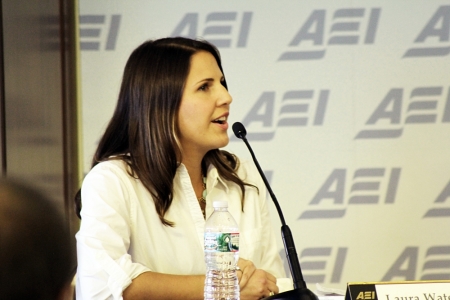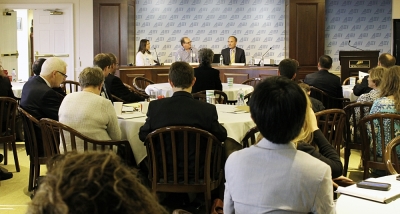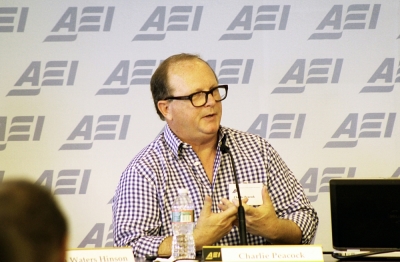Christian Movie Producer Wishes Christian Films Got Dirty

WASHINGTON – Christian film producer Laura Waters Hinson has a problem with Christian films: they dont cover the really tough issues accurately.
Hinson said something that bothers her in the industry of Christian film is that they don't get dirty and cover the issues as deeply as secular cinema. She said what makes a great film is an "accurate portrayal of darkness, and how it can be overcome by light."

"I think that's where, just to be frank, Christian movies fall so short," Hinson said. "There's not an actual authentic representation of real people really, truly struggling. And film makers being bold enough to show the depth of the brokeness. Being too afraid...needing to whitewash everything. So really the payoff of the light never really comes."
Hinson spoke at the 2014 AEI Evangelical Leadership Converence in the "Song and Cinema: Why Engagement Upstream Matters" panel along with singer/songwriter Charlie Peacock and moderator Mark Rodgers.
Hinson said that she believed culture was a huge part in the most important thing cinema is a part of: Storytelling. "I think for me as a film maker I think story telling is at the heart of culture," Hinson explained. "I think that the stories we tell create the culture that we live in."
When asked about the overtness of gospel themes in music and film, Hinson said that a lot of Christian media "doesn't trust the audience."
"I think the Christian content that I typically think of, the films, the books or whatever, have to have a clear representation of the gospel message," Hinson recounted. "Rather than being content to weave througout the themes of the book gospel themes. In films today...it has to have that presentation of Jesus rather than to being content to just fall short, to leave questions unasnwered, to allow the audience to make their own conlusions, to trust the audience. I think a lot of Christian Content doesn't trust the audience. Which drives me crazy."

Peacock, who has produced for the Civil Wars and a song on the soundtrack to the film "12 Years A Slave," pointed out that while the message of all Chrisitan mediums should be Christ, sometimes musically it is ok to use secular music as a barometer to make the best music possible.
In the realm of music, Peacock explained that Christian content and its nuances have to be defined by the time period in which the art was created, and temperature of the church at that moment. "If an artist begins to create in a time period, whether it is 2015 or 1973, depending on what the climate of the church is there might be an emphasis on the explicit."
Peacock explained, "There may be a time when the church is very, very ignorant of the arts. And so they don't have the arts language.They're not able to understand that the arts are filled with implicit and explicit expression. So for them Christian arts is only that which is explicit."
Peacock then explained the other side of the spectrum, where in today's age Christians may miss the message because of implication. "At another time you might have a shift of people who are trying to make a correction," Peacock said. "And they move all the way to the other side because it is all implicit. Most Christians can't pick up the signal. They're like 'Is this supposed to be Chrsitian? I have no idea what's going on here.' " Peacock said that constant struggle gets under his skin sometimes.
The panelists discussed the state of the music and film industry in not only the Christian niche but the secular world as well. Hinson presented a clip of her film "Mama Rwanda," a documentary about Rwandan working mothers becoming entrepreneurs to pull their families out of poverty and their forgiveness of the people who killed their families in mass genocide.
Rodgers brought with him what he called the "Culture Box", which contained different artifacts from different time periods where culture changed. He used this to illustrate how the world's view changes, but maintains that the Christian worldview should always remain the same.





















